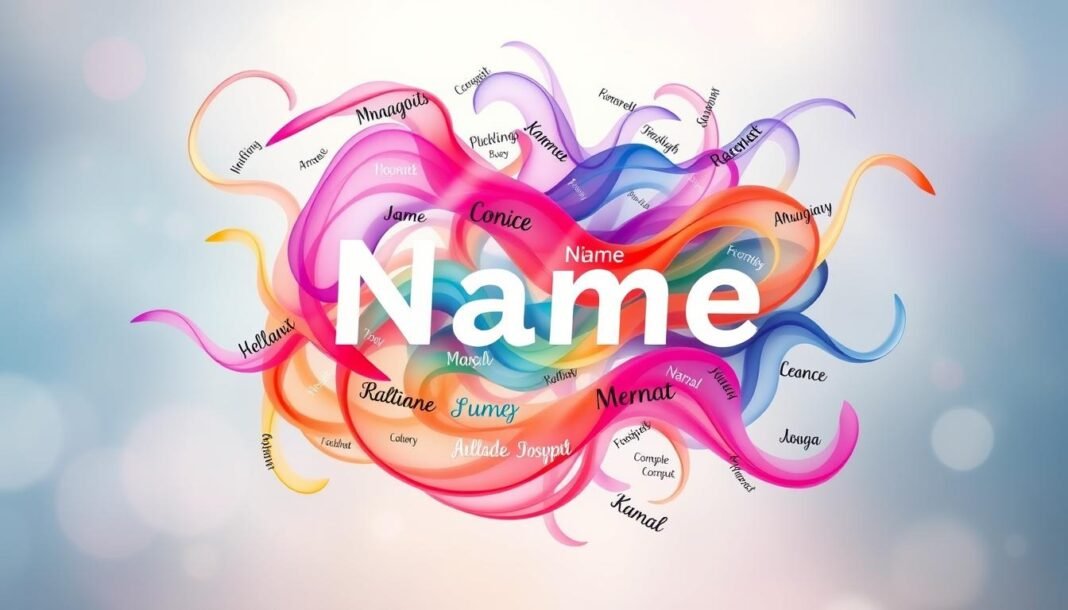Introducing yourself is a universal practice. It’s deeply rooted in the cultural significance of names.
“What’s your name?” is a powerful icebreaker. It opens the door to each person’s unique identity.
A vibrant abstract representation of the concept of “name,” featuring colorful swirling patterns and shapes that symbolize identity, connection, and communication, with light flowing through to evoke a sense of warmth and inclusivity.
Names are more than just labels. They shape our identities and first impressions.
Names influence how we navigate social situations. They inform our understanding of one another across cultures.
Your name can establish a memorable connection. It can pique curiosity or influence a relationship’s course.
Understanding the cultural nuances of names is essential. It helps us navigate introductions with sensitivity and social skills.
The Importance of Names in Society
Names shape our personal and cultural identity. They reflect our heritage, values, and aspirations.
Naming traditions are rooted in various cultures. A name can impact social status, career prospects, and personal branding.
A person’s name is tied to their cultural identity. Names often carry symbolic meaning, reflecting beliefs and customs.
By embracing their name, people feel connected to their heritage. This is vital for communities to preserve cultural traditions.
A person’s name can influence their branding. It shapes how others perceive them in professional settings.
Employers may judge based on a candidate’s name. This can affect hiring and promotion decisions.
Unique names may face challenges in the job market. This highlights the importance of personal branding.
Names underscore the need to understand cultural identity. Appreciating naming traditions fosters a more inclusive society.
Embracing diverse names celebrates unique stories and experiences. It helps create a more equitable world for everyone.
Common Ways to Introduce Yourself
Crafting an effective self-introduction is key for networking and making great impressions. It’s a vital skill for professional events and meeting new people.
The elevator pitch is a popular way to introduce yourself. It’s a summary of who you are and what you do.
Your pitch should highlight your skills, interests, and goals clearly. Practice it to ensure smooth delivery and spark interest in listeners.
You can also use an icebreaker to introduce yourself. Comment on your surroundings or ask an interesting question.
Sharing a short personal story can help create a natural connection. This approach breaks the ice and makes people feel at ease.
Be aware of cultural differences when introducing yourself. Some cultures prefer formal introductions, while others are more casual.
Research local customs to make a good impression. This will help you tailor your introduction to fit the situation.
The Psychology of Names
Names shape our identities beyond simple introductions. They influence our self-perception and life path.
Names affect academic performance and career choices. They also impact how others see us.
Easy-to-pronounce names often get positive views. Unique names may face hidden biases.
Name-based stereotypes can affect job prospects and social interactions. They may also shape a person’s self-concept.
A vibrant, abstract representation of the concept of name psychology, featuring flowing colors and shapes that symbolize identity and personal connections, intertwining various names as ethereal forms, surrounded by a dreamlike background of soft gradients and subtle textures that evoke emotions associated with names.
Name psychology reveals how labels shape our identities. Understanding this can help address name-based biases.
This knowledge can create more inclusive environments. It helps us navigate the complex world of names.
Unique Names: Challenges and Advantages
Having an uncommon name can be both good and bad. It can help you stand out and make a strong impression.
A unique name can be a source of pride. It can also make it easy to remember.
But there are challenges, too. You may need to spell your name often.
Name discrimination is a real problem. Some people may judge you based on your name alone.
This can be hard at work. It might lead to missed chances.
But a unique name can also be helpful. It can start conversations and express who you are.
Your view on having a unique name matters most. You can turn it into a powerful tool.
Use your name to build a strong brand. It can help in both personal and work life.
Names Around the World
Global naming customs are vital for cultural diversity. They offer a glimpse into human identity across different societies.
In Iceland, last names come from the father’s first name. Some African cultures use the mother’s surname for children.
In parts of India, names can show social standing. This comes from the historical caste system.
Naming ceremonies are important in many cultures. They often have deep spiritual and communal meaning.
Japan has Shinto-inspired naming rituals. West African countries celebrate with elaborate festivities.
Learning about these practices helps us understand other cultures better. It also improves our international etiquette skills.
The Evolution of Naming Trends
Names have changed a lot over the years. They show how our society has grown and changed.
In the 1950s, classic names were prevalent. Now, parents want unique names for their kids.
Famous people have changed how we pick names. Parents now choose names that match their values or culture.
Naming trends will keep changing in the future. Names still shape who we are and how we connect.

Asking for Names: Etiquette and Best Practices
Addressing someone by name shows respect and engagement. Ask politely how to pronounce their name correctly. Remember it during your chat.
This small gesture shows interest in the person. It helps build a good connection.
Be aware of cultural differences in naming. Some cultures put family names first. Others use multiple names or nicknames.
Ask how people prefer to be addressed. This shows consideration and builds trust.
Names are personal and deserve respect. Treat them well for success.
Follow these tips to handle name-related talks smoothly. You’ll strengthen connections and show cultural awareness.
FAQ
What’s the significance of asking “What’s your name?” in social interactions?
Asking “What’s your name?” is a key part of social interactions. Names shape first impressions and how people see us across cultures.
How do names shape personal and cultural identity?
Names reflect heritage, social status, and personal branding in modern society. They impact how others see us and our social and work chances.
What are some standard techniques for effective self-introductions?
Eye contact and a firm handshake make a good first impression. Give a short overview of your background and interests.
How do names impact an individual’s psychology and behavior?
Names can affect personality traits, school results, and job choices. They shape how we see ourselves and act.
What are the challenges and advantages of having a unique name?
Unique names may lead to unfair treatment. But they can help people stand out and build a strong brand.
How do naming customs vary across different cultures and countries?
Naming traditions differ significantly around the world. They include family names, special ceremonies, and the use of certain letters.
How have naming trends evolved?
Naming trends change due to famous people, significant events, and societal shifts. Popular names in different decades show how our choices have changed.
What are the best practices for asking and remembering names in professional and social settings?
Show respect when asking for and remembering names. Say names correctly, ask if unsure, and repeat them to help remember.
You may also read : How to Write Your Full Name Correctly on Documents
